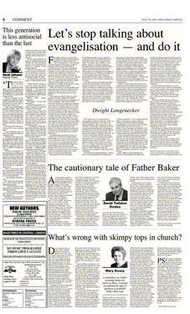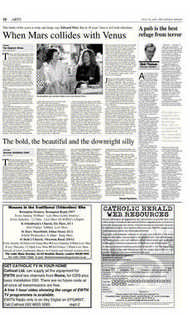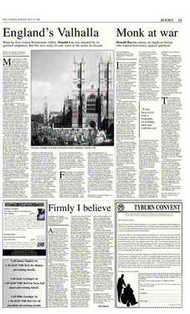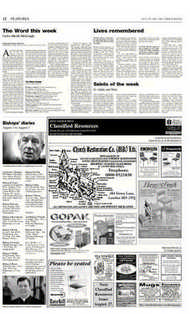Page 9, 30th July 2004
Page 9

Report an error
Noticed an error on this page?If you've noticed an error in this article please click here to report it.
Tags
Share
Related articles
Seeing Through Our Deception
Catholics Have Duty To Evangelise
The Day I Was Summoned To The Nuncio's Study
Cardinal Calls For New Look At Role Of Laity
The Church In France; French And In-looking
THE RIGHT REFORM
Evangelisation is the key to renewal
In every leader’s life there is a defining moment in which the public persona recedes and private intuitions and innermost convictions are laid bare. Cardinal Cormac Murphy-O’Connor’s moment arrived this week, in the form of a fascinating and revealing interview with The Independent. In it, he ended years of speculation by expressing himself clearly and boldly on half a dozen of the most controverted issues in the Catholic Church today. We learned that he favours married priests, the use of condoms where it would prevent death, European integration and robust episcopal intervention in politics. We discovered also that he does not favour women priests or withholding Holy Communion from pro-choice politicians.
In one particularly significant exchange, the interviewer suggested that since the Cardinal was appointed Archbishop of Westminster in 2000, the English Church had been caught in a downward spiral of scandals, corruption, dwindling vocations and disaffected congregations. The archbishop responded with the trusty Latin tag, Ecclesia semper reformanda. This was the crux of the interview: the Church is in a sorry state and it must be reformed.
But what, precisely, is to be done? It is tempting for Catholics to rush to answer this question. It is difficult, when harried by hostile, secular critics, to come up with mature and thoughtful responses to the challenge of reform. But it would be a grave mistake to allow reform to be driven by the secular critique, marked as it is by an obsessive focus on the priesthood and a preference for swift, technological solutions to complex problems. Catholics must take time to ponder whether dispensing with celibacy really would cure the ills of the modern priesthood and to consider whether the relaxation of Catholic sexual ethics truly would attract people back to the Church.
In his interview, the Cardinal expressed admiration for the vibrant Catholicism of Africa and Asia. Why is the Church flourishing there, and not here? Not because African and Asian Catholics have married priests or because they have adapted ethical teaching to local culture, but because they have a dynamic laity alert to its responsibility to spread the Gospel.
The Cardinal recognises that the greatest challenge facing Church leaders today is that of releasing the energies of lay people. He has sought to do this in the Archdiocese of Westminster through the At Your Word, Lord renewal programme. While it is too early to judge the initiative a success, we share the Cardinal’s hope that it will form a strong, educated and active laity in the archdiocese.
Over the coming years bishops, priests and lay people will need to think afresh about the future shape of the Church. It will not be enough simply to revisit the controversies of the past, or to propose piecemeal changes to traditional teaching and disciplines. Any real reform of the Church must place evangelisation, and a renewal of the sacraments, at its heart. Anything less would not halt, but merely hasten the decline of the Catholic Church in these lands.
NO EXCUSES
Time to speak out against Mugabe
At a press conference in London last week, Archbishop Pius Ncube posed this question: “What would Jesus Christ say if he was here today? Would he be quiet if people were being starved to death by a tyrannical state?” The response of the churches to the oppressive regime of Robert Mugabe has not been impressive. Christian leaders in Zimbabwe have bit their tongues as the President turned a once bountiful country into a wasteland of poverty, starvation, terror and decay. Church officials in the West have looked on mutely, afraid to speak out lest they jeopardise relief efforts or were denounced as “neo-colonialists”.
This hesitant and fearful approach was much in evidence last year when Archbishop Ncube visited England to highlight human rights abuses in Zimbabwe, only to be told that if he spoke out his words would be manipulated by the “rightist” press. The excuses for this approach did not stand up to scrutiny then, and they do not do so today.
The argument that Western Church leaders should remain silent because Mr Mugabe would exact revenge on Zimbabweans if prelates spoke out is a weak one. It has disturbing echoes of the claim often heard during the Cold War that the condemnation of Communism would only increase the sufferings of Christians.
As for “neo-colonialism”, we should heed Archbishop Ncube when he says that ordinary Zimbabweans see through Mr Mugabe’s antiWestern rhetoric. They are not taken in by the President’s attempts to blame Britain for the results of the past 24 years of Zanu-PF misrule.
The Church in this country should not be afraid of standing in solidarity with Archbishop Ncube and the long-suffering people of Zimbabwe. The only thing that we should fear is the judgment of history if we remain silent as Zimbabwe descends into the abyss.
blog comments powered by Disqus















